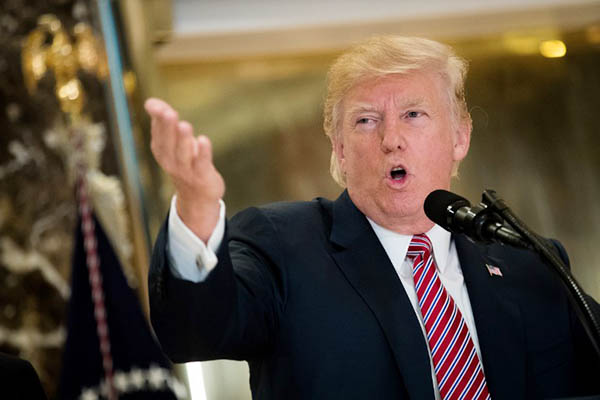
Drew Angerer—Getty Images North America—AFP
In hunt for foreign policy win, U.S. president is hoping to find resolution to longstanding conflicts
In his nuclear standoffs with North Korea and Iran and disputes over Chinese trade and a Mexican wall, Donald Trump bet that his bullying style would get results.
Trump was quick to claim vindication on Wednesday when China reported that North Korea’s Kim Jong-Un is ready to talk nuclear disarmament at their upcoming summit. Indeed, the U.S. president often boasts he has already won concessions from cowed foes and contrite allies, but some say it is too soon to identify major breakthroughs.
For, while Trump’s high-stakes gambles have triggered diplomatic scrambles, they have also boosted the risk of conflict without yet delivering a payoff. And his ultimatums have accelerated the diplomatic time frame by setting new deadlines and thus increasing the odds of a breakdown that could lead to war.
“For years and through many administrations, everyone said that peace and the denuclearization of the Korean Peninsula was not even a small possibility,” he tweeted. “Now there is a good chance that Kim Jong-Un will do what is right for his people and for humanity. Look forward to our meeting!” he boasted.
Trump’s decision to accept an invitation to talks, to be held before the end of May, dumbfounded foreign policy experts and caught his own staff off guard. But it was typical of his style of tearing up the diplomatic rulebook.
It matches his threat to tear up the Iran nuclear deal if European allies do not agree to tougher measures against Tehran and his vow to tear up NAFTA if Canada and Mexico do not make trade concessions.
Trump’s supporters point to the fact that America’s allies have engaged with U.S. negotiators to find a way to appease some of Trump’s concerns. But it is not clear that his acceptance of Kim’s invitation is a win for Washington’s campaign of “maximum pressure.”
Some see it as a gift to a regime that has long seen its drive to obtain nuclear weapons as a means to win international respect—and face-to-face talks. “On the one hand, Trump does seem to have shaken things up and moved things forward in a way that was unimaginable,” said Andrew Mertha of Cornell University. “Unfortunately it comes at the price of pretty much giving Kim what he wanted,” he told AFP.
Jonathan Schanzer of the Foundation for Defense of Democracies, argues sanctions and Trump’s unpredictability have forced opponents like Kim to engage. But, as he told AFP, “all these stories are yet to be written.”
“On North Korea, we’ve seen perhaps the most tangible results, although we certainly don’t see a final outcome.”
Kim visited Beijing this week to confer with Chinese leaders, a reminder that Washington does not hold all the cards. Kim confirmed to China that he is ready to discuss the “denuclearization” of the Korean peninsula, but this may mean different things to each side.
Washington will accept nothing less than Pyongyang verifiably giving up its nuclear arsenal, fuel enrichment and ballistic missile program. But Kim is likely to insist “denuclearization” includes withdrawing the promise of a U.S. “nuclear umbrella” to deter attacks on its treaty ally South Korea. And he will repeat his demand that U.S. forces leave the peninsula, an extraordinary concession that it is hard to imagine any previous U.S. president acceding to.
And Kim does not seem intimidated.
Monday was his first foreign foray as leader, arriving in Beijing in an armored train for talks with China’s powerful leader Xi Jinping. Xi will have given Kim a very clear idea of what China is prepared to accept from the summit, but Kim’s isolation is over and he may play Washington against Beijing.
Perhaps Trump did play into Kim hands by accepting talks without first discussing the North Korean and Chinese red lines. And perhaps he was over ambitious when he tried to get London, Paris and Berlin to rewrite an Iran deal they seem only prepared to tweak or update. But, since these initiatives began, he has made some personnel changes at home that could show his negotiating partners that he means business.
Trump has sacked his secretary of state, Rex Tillerson, who backed the Iran deal and favored cautious diplomacy with North Korea. He plans to replace Tillerson with hardline CIA chief Mike Pompeo and his national security adviser HR McMaster with notorious hawk John Bolton.
Bolton is an advocate of regime change in Iran and as recently as last month he warned that negotiations would only give Kim more time to build missiles. “The dynamics have changed,” Schanzer said, arguing that European leaders should now take more seriously the idea that Trump is ready to tear up the Iran deal. “The president has been playing hardball, and he hasn’t lost doing so yet. He hasn’t won, but he certainly hasn’t lost,” he said.
If Trump fails to win concessions on Iran, he can dump the deal and re-impose sanctions on Tehran’s regime and any European bank that continues to deal with it. But if North Korean talks break down, does that make a devastating war more likely?
“There’s a greater chance of a breakthrough under Trump but there’s also a greater chance that this whole thing explodes and that we end up in military confrontation,” said Ian Bremmer, head of consultants the Eurasia Group.
